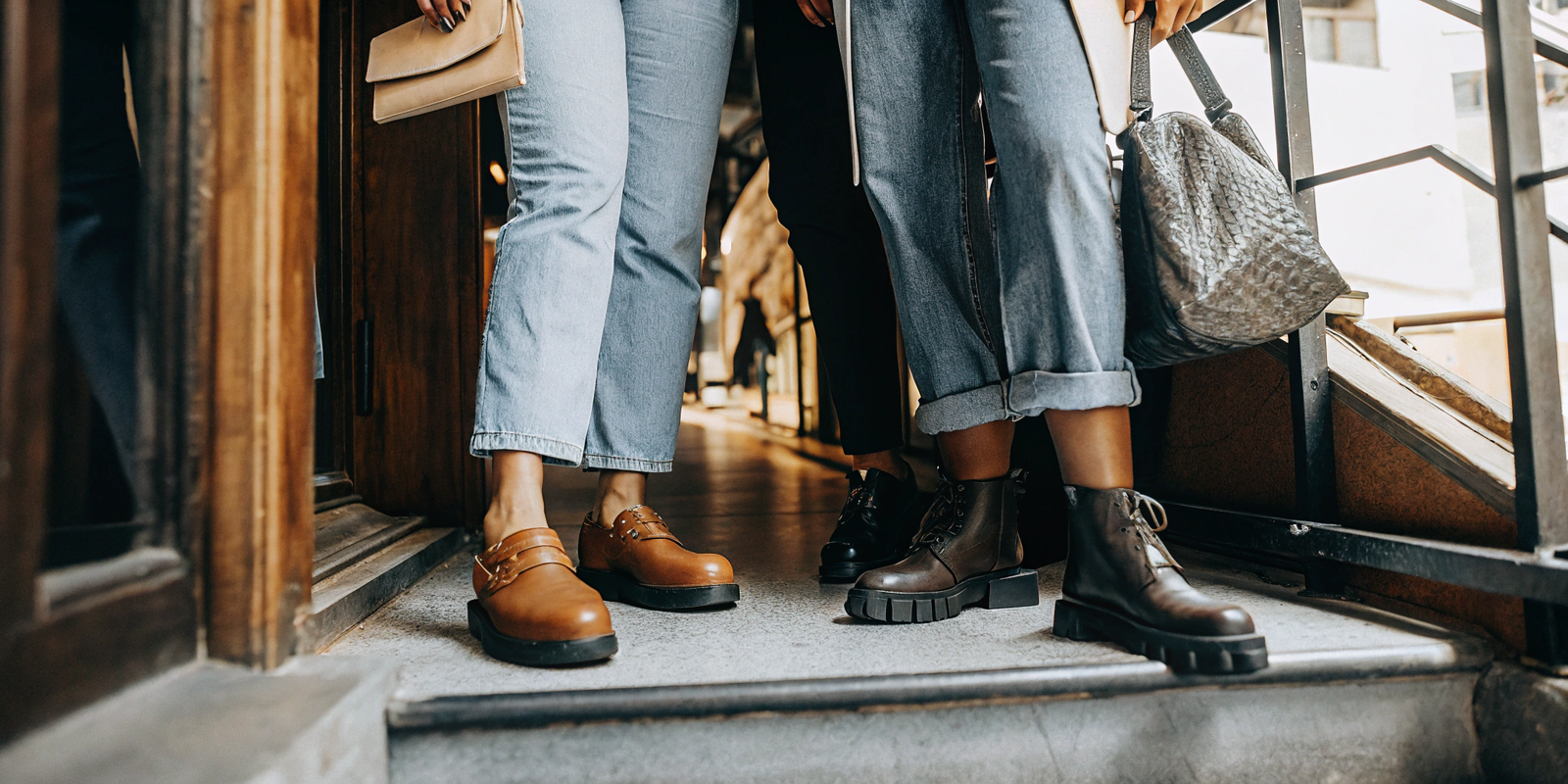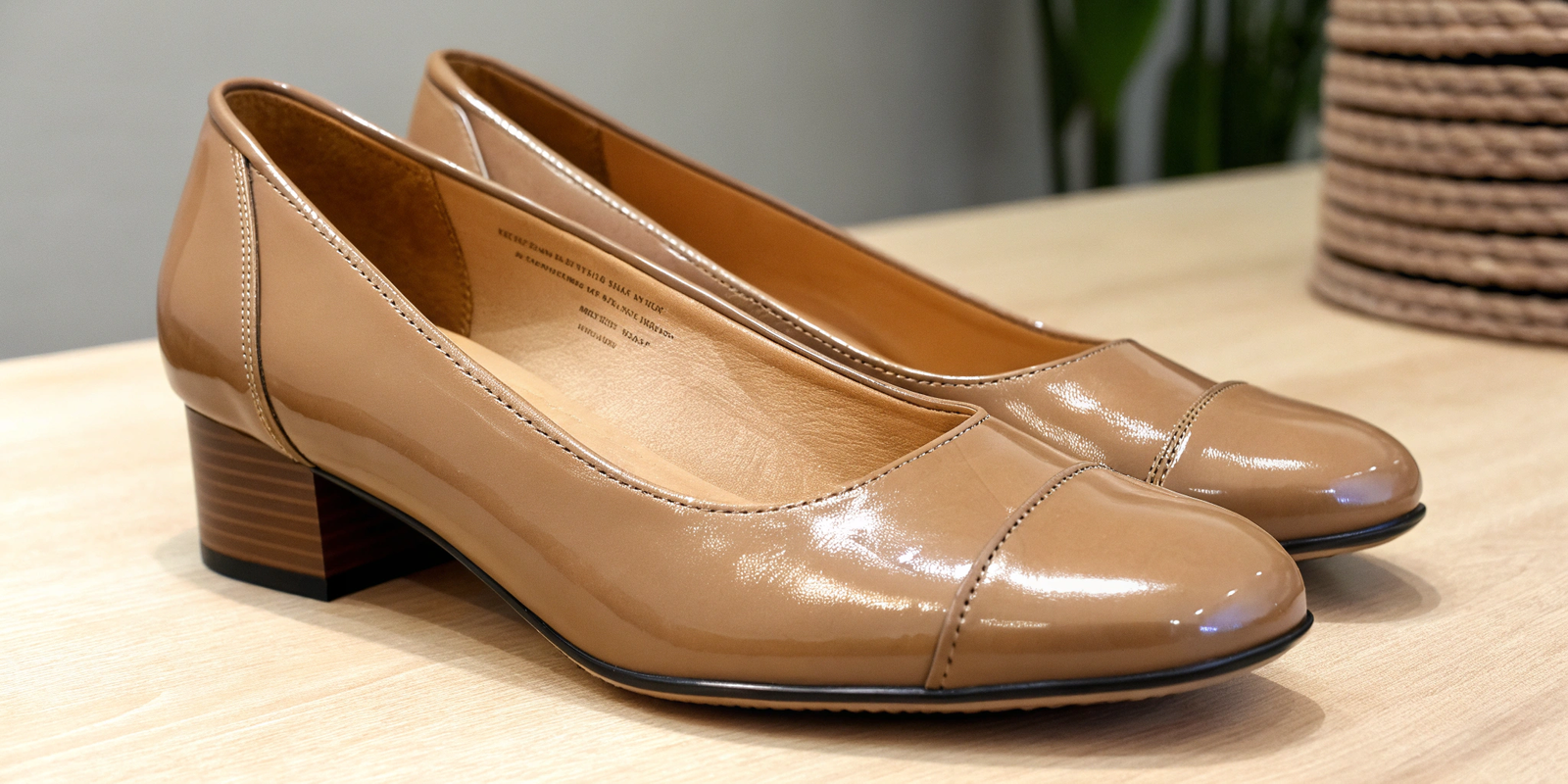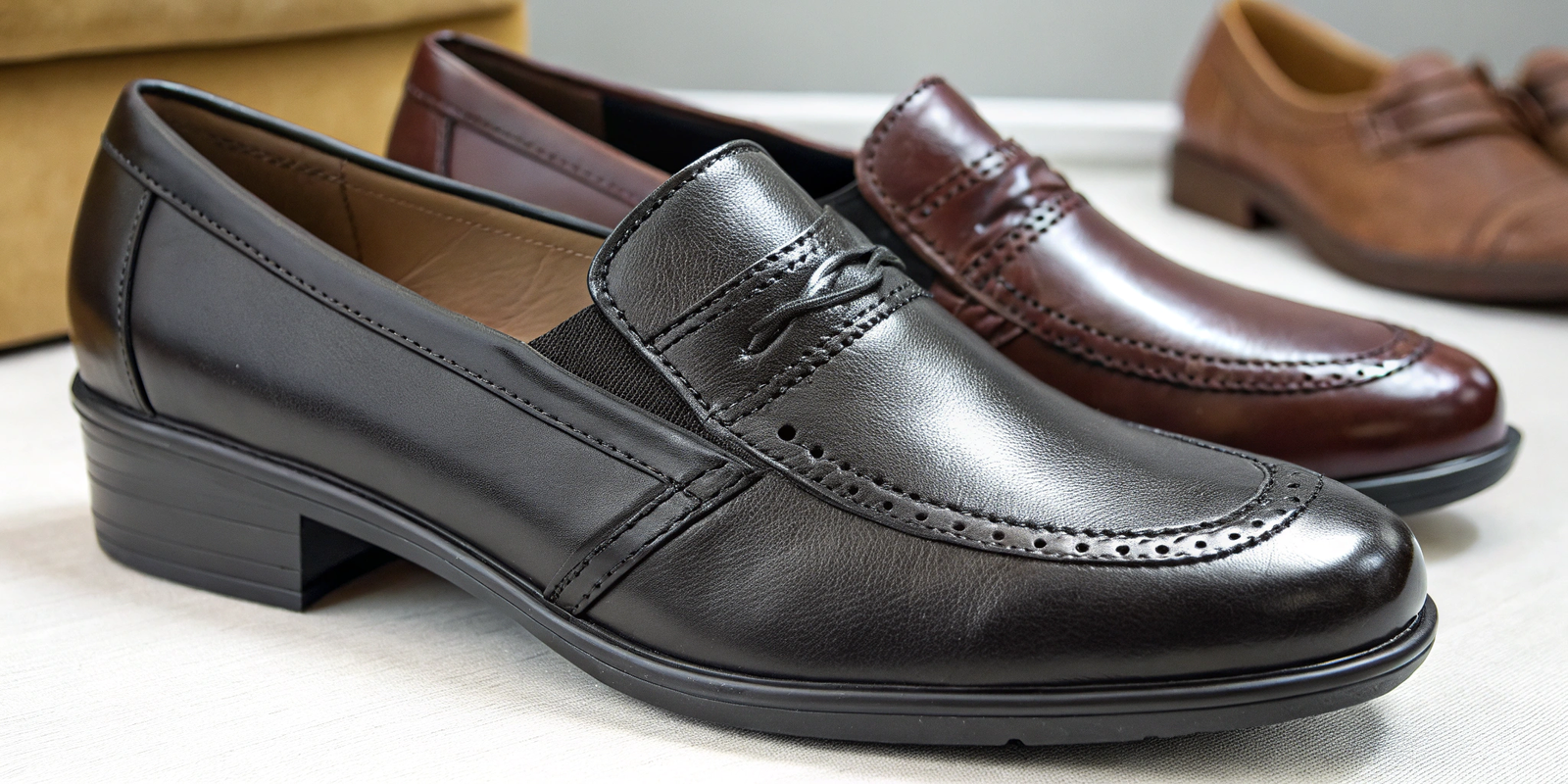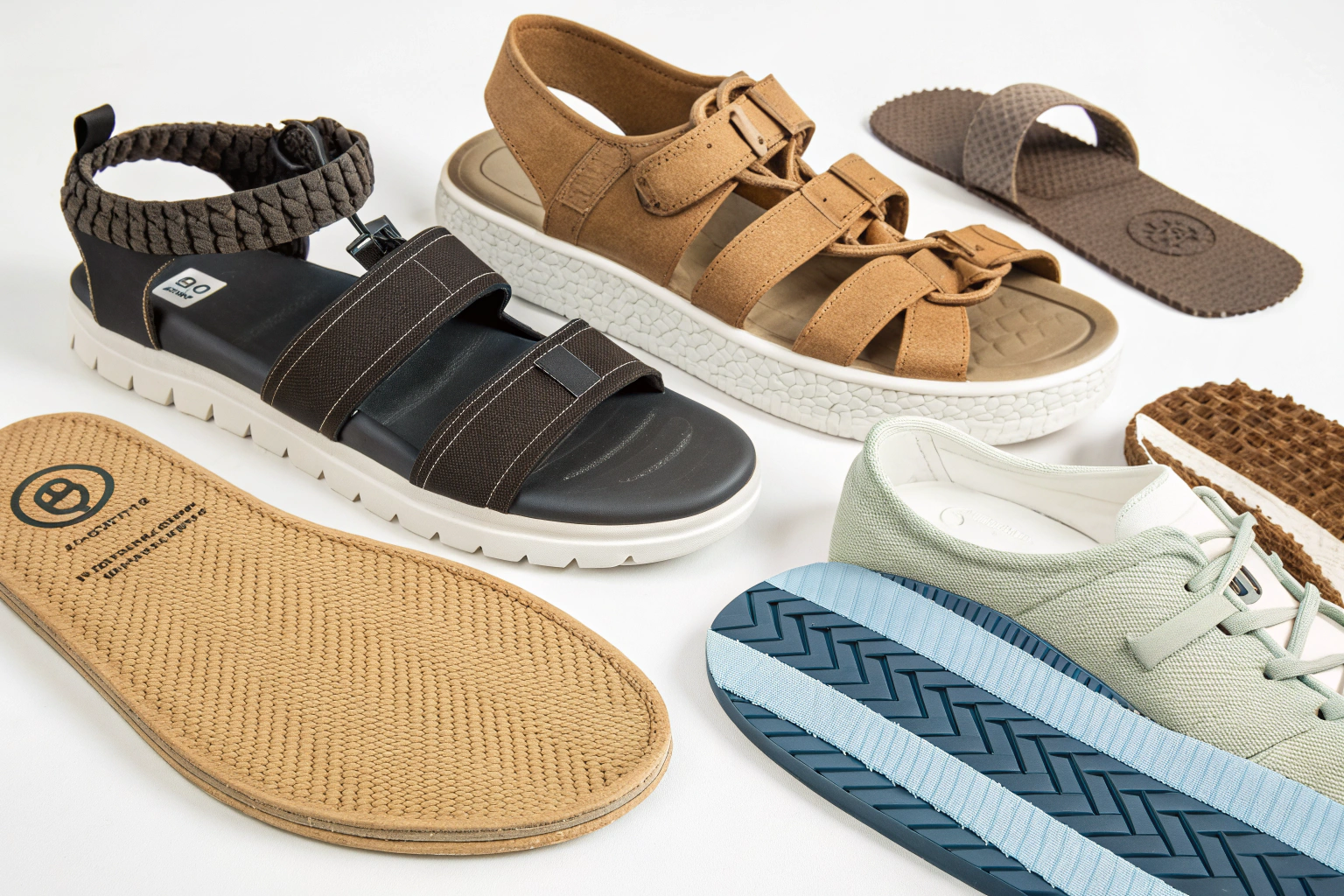Sustainable Women’s Footwear 2025: Vegan Leather, Recycled Materials, and Sourcing Trends
 For manufacturers like us at Lucas, this shift is practical, not theoretical. We focus on materials that reduce impact, meet testing standards, and scale for large orders. The goal is simple: deliver products that sell well and stand up to scrutiny.
For manufacturers like us at Lucas, this shift is practical, not theoretical. We focus on materials that reduce impact, meet testing standards, and scale for large orders. The goal is simple: deliver products that sell well and stand up to scrutiny.
Why Leather Is Evolving, Not Disappearing
Leather still defines premium women’s footwear in heels, boots, and formal silhouettes because of its durability, comfort, and look. But the material now sits under stronger environmental and ethical review.
- Environmental footprint: Livestock drives emissions and land use.
- Tanning chemicals: Conventional tanning may involve heavy metals.
- Consumer shift: Demand grows for traceable and lower-impact options.
Instead of vanishing, leather is adapting. Buyers expect LWG-certified tanneries, documented traceability, and cleaner processes. This keeps leather relevant while opening space for alternatives that satisfy sustainable shoe sourcing in 2025.
---
Vegan Leather: A Key Trend in Women’s Shoes
The rise of vegan leather women’s shoes suppliers is one of the biggest sourcing shifts. Modern alternatives are no longer “plastic imitations.” They offer good aesthetics, stable performance, and strong market stories.
What’s changing in 2025:
- Bio-based vegan leather: Mycelium (mushroom), cactus, pineapple, apple, and grape waste provide distinctive textures and lower impact.
- Advanced recycled synthetics: Recycled PU/PET blends improve abrasion resistance, flexibility, and breathability.
- Luxury adoption: Pumps, sandals, and boots in vegan options move from niche to mainstream.
- Circular design: Some bio-based options target recyclability or biodegradability at end of life.
For buyers, these materials help balance style, sustainability, and cost across mid- to high-end women’s footwear.

How Durable Are Vegan and Recycled Shoes?
Durability drives wholesale decisions. Early low-grade synthetics underperformed, but current options do far better. Use the guide below when planning category placement and warranty expectations.
| Material Class | Typical Lifespan (Guidance) | Notes for Category Placement |
|---|---|---|
| Low-grade PVC/PU | 1–3 years | Not ideal for premium; risk of cracking/peeling. |
| High-quality recycled PU / PET | 3–7 years | Strong candidate for casual/formal volume lines. |
| Bio-based vegan leather (mushroom/cactus/etc.) | 5–10+ years (emerging) | Suitable for elevated lines; performance improving quickly. |
Practical tip: Validate with abrasion, flex, colorfastness, and hydrolysis tests, plus outsole adhesion testing. Pair material upgrades with water-based adhesives for a cleaner bill of materials.
Are Vegan Shoes Truly Eco-Friendly?
It depends on inputs and processes. “Vegan” alone does not guarantee low impact. The strongest results come from recycled content, bio-based feedstocks, and cleaner chemistry.
Strengths
- Avoids livestock emissions and land use.
- Lower water use than leather tanning.
- No chromium tanning.
Challenges
- Fossil-based synthetics can shed microplastics.
- Legacy PU/PVC is hard to recycle and can persist in landfills.
- Supply chain data can be incomplete without audits.
Best practices for eco-friendly women’s footwear wholesale
- Prioritize bio-based vegan leather and recycled synthetics with traceable inputs.
- Use water-based adhesives and low-impact dyes.
- Verify with GRS, OEKO-TEX, LWG, BSCI/SEDEX, and ISO where relevant.
Beyond Leather: Recycled Materials That Matter
Sustainable sourcing covers the whole bill of materials, not just uppers.
- Recycled polyester (rPET): Linings, straps, woven uppers for sandals and sneakers.
- Recycled rubber: Durable outsoles for casual and outdoor lines.
- Recycled EVA: Lightweight midsoles/insoles with comfortable rebound.
- Ocean-bound plastics: Breathable knits for casual shoes and slip-ons.
These inputs support credible marketing claims and reduce reliance on virgin materials, which helps both compliance and storytelling.
How to Evaluate a Sustainable Shoe Supplier
Selecting the right partner determines speed, quality, and credibility. Use this checklist when comparing a recycled material shoes supplier or a vegan leather women’s shoes supplier:
- Material portfolio: Bio-based vegan options, recycled PU/PET, recycled rubber, and rPET textiles.
- Certifications: LWG (for leather programs), GRS, OEKO-TEX, BSCI/SEDEX, and ISO systems.
- Testing capability: Abrasion, flex, hydrolysis, slip, and colorfastness aligned to destination-market standards.
- Scalability: Proven capacity for on-time delivery at program volumes; transparent lead-time planning.
- Traceability: Clear documentation of raw materials and factories; support for product-level sustainability claims.
- Sampling speed: Fast prototyping to confirm color/fit/comfort before committing to bulk.
- After-sales support: Structured CAPA (Corrective and Preventive Action) for quality incidents.
Sizing, Fit, and Construction: Small Details, Big Results
Sustainable materials perform best when construction is tight and consistent.
- Pattern engineering: Optimize yield to reduce cutting waste on vegan sheets and recycled textiles.
- Adhesive system: Match water-based adhesives to material porosity and factory conditions for strong bond strength.
- Lasts and grading: Maintain consistent women’s sizing across regions; validate with wearer trials for boots, pumps, and sneakers.
- Comfort components: Combine recycled EVA footbeds with breathable liners to offset heat build-up in coated materials.
These steps lift product reviews and reduce returns—critical for retailers and brands scaling sustainable ranges.
Practical Roadmap for 2025 Collections
Use this phased plan to de-risk adoption while protecting margins:
- Pilot (Q1–Q2): Launch 2–3 women’s styles per category (sandals, sneakers, boots) using recycled synthetics and one bio-based vegan leather. Run lab tests and limited in-store trials.
- Scale (Q3): Expand successful SKUs, add colorways, and introduce recycled outsole compounds. Lock in long-lead materials early.
- Optimize (Q4): Improve yields, consolidate suppliers, and publish simplified sustainability data sheets to support retail and e-commerce content.
SEO-Friendly FAQs (Quick Answers for Sourcing Teams)
Is leather still relevant in 2025?
Yes—especially in premium lines—but it must be transparent and certified. Many programs mix improved leather with vegan and recycled options.
Are vegan leather shoes durable enough for wholesale?
Modern bio-based and recycled synthetics now meet 3–10+ year durability ranges depending on construction and use case.
What makes a supplier credible for eco-friendly women’s footwear wholesale?
A broad material portfolio, recognized certifications, reliable testing, and documented traceability.
How do I market sustainable shoes without greenwashing?
Use verifiable claims (percent recycled content, named bio-based inputs), align with GRS/LWG/OEKO-TEX, and provide concise data sheets.
Conclusion: The Future of Sustainable Shoe Sourcing
By 2025, leather remains—but with stricter standards—while vegan leather and recycled materials take center stage in women’s footwear. The winning path is a balanced mix: proven durability, cleaner chemistry, real traceability, and scalable production. For brands and retailers, partnering with a reliable vegan leather women’s shoes supplier or recycled material shoes supplier is the fastest route to products that customers love and regulators approve.
At Lucas, we build that balance into every collection—so your sustainable women’s footwear program is ready for the market, not just the mood.

